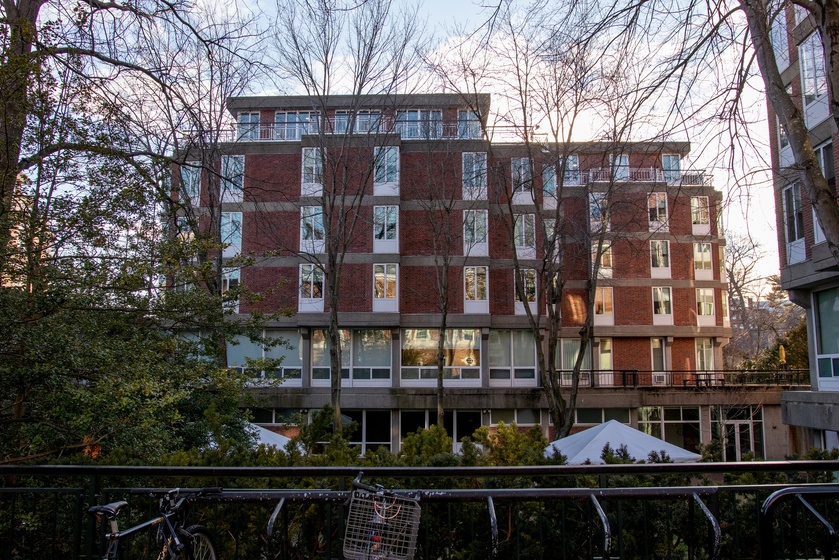{shortcode-8fd5fef3aa823654bce4d1f7c8996a81d1329829}
{shortcode-24643cedbe14221289878261864001a8ceef067a}n some mornings, Cas Li ’25 — a resident of Currier House — can be seen leaving Cronkhite on a scooter, with an entrepreneurial spirit and a backpack full of eggs.
Their poultry experiment began during Li’s sophomore year, when they began selling eggs from their family’s backyard chicken coop in Haverhill, Massachusetts on the Currierwire email list.
“The first time I did it, I posted it super widely because I didn’t think that people would be buying eggs,” Li says. “But within a few minutes of my email, people were just like, ‘Hi, can I have eggs?’”
Two years later, Li still sells their family’s eggs to Currier residents. But despite their increased business experience, the operation hasn’t evolved much. The authentic farm-to-table enterprise relies on Li’s parents driving 40 minutes down the North Shore to Cambridge, eggs in hand, every week or so. Next, Li publicizes their new supply on Currierwire, often including a Google Form to keep a handle on high demand.
If Currier residents are lucky, they’ll be treated to a photo or two of the chickens themselves. Two of them are named Fentanyl and Opium, in addition to Li’s favorite, Gerald, and her sister, Octavius.
When the form fills up, often within 15 minutes or less, Li is off on their scooter, bringing their hometown farm straight to Harvard’s table. Friends get first dibs; afterwards, the free market of Currier takes complete hold. Lisa Lin ’26, a self-proclaimed egg enthusiast and one of Li’s most frequent customers, has refined her taste so precisely that she can now taste the difference between the eggs of free-range versus pasture-raised chickens.
“I trust that Cas takes very good care of their chickens and is very passionate about it,” Lin says.
While Li and Lin’s friendship began in the Harvard Undergraduate Women in Computer Science student group, their biweekly exchange of eggs has brought them even closer.
When Li’s casual startup was first born, they personally offered Lin first dibs. Lin’s response was adamant: “Yes, yes, yes, yes, yes, yes, yes, yes.”
Since that day, Lin has never failed to support Li’s business.
“My doctor told me I should eat less eggs because my cholesterol is too high, that’s how much I like eggs,” Lin says.
Evidently, she hasn’t quite followed doctor’s orders. “My worst was I went through one carton in a week, but I think right now we’re doing every two or three weeks,” Lin says.
Another customer, Lucie E. Bai ’26, relies on Li’s eggs for different reasons. “For the last three or four weeks, I’ve been vegetarian, and so eggs have been my main source of protein,” she says.
Both Lin and Bai note that their main draw to Li’s business is the customization options they can explore with directly delivered eggs.
For Bai, this customization means she can enjoy a soft-boiled egg instead of the hard-boiled variant provided by HUDS. Lin takes it a step further, using fresh eggs, dining hall ingredients, and a dorm microwave to concoct a whole range of various egg-related delicacies.
“So, you can obviously just get a cup from the dhall, and then put some water in it, put the egg inside, put a damp piece of cloth or put a damp towel over it, and then that’ll make you a nice little poached egg,” Bai says. Adding soy sauce and scallions, she adds, gets you Korean steamed eggs, while mixing eggs into instant ramen adds flavor to the prepackaged meal.
In recent months, though, Li has made one change in their operation — raising the price of eggs from $6 to $7 per dozen.
“I felt bad raising my prices,” Li says, while noting they did so to keep up with the increase in market price as a result of the bird flu epidemic. While the disease isn’t prevalent in Massachusetts and hasn’t affected their birds specifically, Li says that they and their family were taking precautions to ensure their chickens’ health.
The egg inflation hasn’t seemed to cause a dip in demand, though.
“If Cas charged more, I’d probably still pay,” Lin says. Bai also points out that “compared to getting them from the grocery store, they were a lot cheaper.”
Li says that, after the price jump, several customers encouraged them to raise prices even more, but they hesitated to go beyond a modest dollar.
“I don’t really run this as a business to be profitable,” they say.
“I’m just like, let’s get rid of some eggs, and try to contribute towards the cost of the chicken feed and upkeep,” Li adds.
All good things come to an end, though, and after Li graduates this year, Currier will be without local poultry.
“I will be very, very sad when they graduate,” Lin says. “I will have to go back to my Trader Joe’s eggs,” she adds with a sigh.
—Magazine writer Jolana Kampfová can be reached at Jolana Kampfova jolana.kampfova@thecrimson.com.


